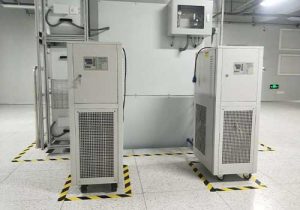large chiller
Introduction to Large Chillers
Large chillers are high-capacity cooling systems designed for industrial and commercial applications where the demand for cooling is substantial. These chillers are used in a variety of settings, including large office buildings, factories, and data centers, to maintain optimal temperatures for comfort and process control.

Types of Large Chillers
Large chillers come in several types, each with its own advantages and applications:
Water-Cooled Chillers: These chillers use water as the cooling medium, which is circulated through a heat exchanger to dissipate heat. They are suitable for applications where water is readily available and can be used for cooling.
Air-Cooled Chillers: These chillers use ambient air for condenser cooling, making them suitable for applications where water supply is limited or不便. They are often used in areas with low water availability or high water costs.
Applications of Large Chillers
Large chillers are used in a variety of applications where high cooling capacities are required:
Air Conditioning: In large commercial buildings, large chillers provide the necessary cooling for comfortable indoor environments.
Industrial Cooling: In manufacturing processes, such as semiconductor manufacturing or laser cutting, large chillers help maintain stable temperatures for precision operations.
Laser Processing Systems: High-performance chillers are used to cool laser equipment, ensuring efficient and precise operation.

Energy Efficiency of Large Chillers
Energy efficiency is a critical consideration in the operation of large chillers. Features that contribute to energy efficiency include:
Variable Frequency Drives (VFDs): VFDs allow the chiller’s compressor to operate at variable speeds, adjusting to the cooling load and reducing energy consumption.
Large Chilled Water Temperature Differences: Using larger temperature differences in the chilled water system can reduce the size of the equipment and save energy without compromising thermal comfort.
Maintenance and Safety
Regular maintenance is essential for the efficient operation and safety of large chillers. Maintenance practices include:
Regular Inspections: Inspecting the chiller for any signs of wear or damage, such as frayed cords or broken components.
Cleaning: Regularly cleaning the condenser and evaporator coils to ensure optimal heat transfer and prevent efficiency loss.

Safety Features: Ensuring that the chiller is equipped with safety features like high-pressure relief valves and emergency shut-off switches.
Industry Standards
Industry standards guide the selection and operation of large chillers to ensure energy efficiency and reliability. Standards may include:
ASHRAE Standards: The American Society of Heating, Refrigerating, and Air-Conditioning Engineers (ASHRAE) provides guidelines for the design and operation of chiller systems.
Energy Efficiency Ratings: Chillers may be rated for energy efficiency, with higher ratings indicating lower energy consumption and operating costs.
Conclusion
Large chillers are vital components in many industrial and commercial cooling applications. They offer high cooling capacities and energy efficiency through advanced features and maintenance practices. By adhering to industry standards and best practices, large chillers can provide reliable and efficient cooling solutions for a wide range of applications. Regular maintenance and safety precautions are essential to ensure the longevity and safe operation of these systems.
Related recommendations
water bath with thermostat
532Water Bath with Thermostat: A Crucial Tool for Temperature Control in Laboratories A water bath with a thermostat, also known as a thermostat water bath, is a vital piece of equipment in scient...
View detailschiller for injection molding machine
346IntroductionInjection molding is a widely used manufacturing process for producing plastic parts in various industries, from automotive and electronics to consumer goods. The quality and efficien...
View detailsWhy do Chillers need to be Cleaned Regularly?
1658Why do Chillers need to be Cleaned Regularly? Why do chillers need to be cleaned regularly? Because the chiller has been used for a long time, there are often some dirt accumulations in the c...
View detailsThe Difference between Open Chiller and Water-cooled Box Chiller
1740The Difference between Open Chiller and Water-cooled Box Chiller Everyone knows that chillers can be classified in various and complicated ways. It is mainly divided into two types: air-coole...
View details
 LNEYA Chiller
LNEYA Chiller







HelloPlease log in